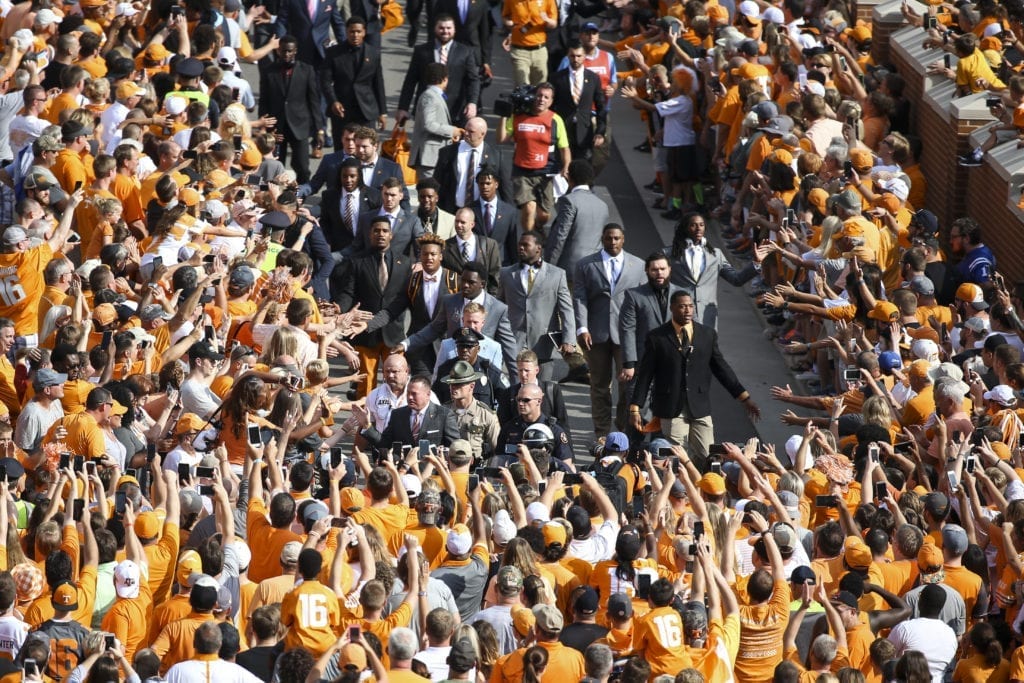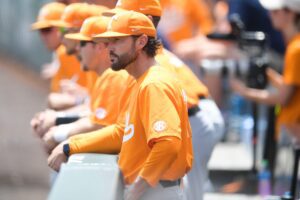SEC Unbiased: Quarterback play could derail the SEC
While the SEC remains the premier conference in college football, concerns with numerous quarterback situations could result in the college football empire’s downfall.

KNOXVILLE, TN - SEPTEMBER 01, 2016 - Tennessee Volunteers Head Coach Butch Jones leads the University of Tennessee Football team through the Vol Walk before the game between the Appalachian State Mountaineers and the Tennessee Volunteers at Neyland Stadium in Knoxville, TN. Photo By Alison P. McNabbTennessee Athletics
The SEC is an empire with such a daunting resumé it challenges some of the greatest conferences of all-time. From the mid-1980s until the late-1990s, the NFC won 13-consecutive Super Bowls by an average margin of 20.8 points per game. A team representing the Western Conference won the NBA Finals a staggering 10 times over a 13-year period stretching from 1998 until 2011. Ever since Texas quarterback Vince Young ended the USC Trojan dynasty of the mid-2000s with a historic performance in the 2006 Rose Bowl, an SEC program has won the national championship eight times over the past decade.
With a new college football season comes yet another set of high expectations for the nation’s deepest conference in terms of recruiting, talent and coaching. But if opening Saturday was the pole vault, the SEC fell well short of its towering bar and crash landed.
The LSU Tigers—a popular pick to win the SEC West—lost an old-school, smashmouth affair to the unranked Wisconsin Badgers and could potentially Lambeau Leap outside of the top-10. Texas A&M nearly blew a 15-point fourth quarter lead to UCLA before closing the deal in overtime. Vanderbilt and South Carolina engaged in a battle less entertaining than witnessing paint dry on growing grass. In case you haven’t heard, the Vols barely escaped out of Neyland with a win Thursday night after surviving in overtime against Appalachian State. Arkansas struggled against Louisiana Tech and squeaked out a one-point victory. Mizzou lost fairly handily to West Virginia. It took Florida a full 60 minutes to put away UMass. Kentucky squandered a 25-point lead to Southern Miss. Oh, and Mississippi State began life without Dak Prescott in depressing fashion with a loss to South Alabama—a football program younger than Hulu.
It wasn’t all bad for the SEC. Alabama rolled all over USC, 52-6, and continued the tradition of Nick Saban teams tormenting first-year starting quarterbacks, as well as fielding the nation’s most overpowering and athletic defense. Behind the wheels of star running back Nick Chubb, Georgia kicked off the Kirby Smart era with an impressive victory over North Carolina. And Auburn managed to hang with the No. 2-ranked Clemson Tigers, but ultimately fell short after two failed Hail Mary attempts, proving that miracles won’t carry them to a SEC title this season.
But even in victory, the conference as a whole suffered from a common theme: Poor quarterback play.
There were already concerns heading into the season that the SEC might experience a down year due to questionable play under center. So far, those fears have become reality. And it’s enough to derail the conference.
A team in the SEC doesn’t need a Heisman-caliber quarterback to compete for championships. Sure, Florida had Tim Tebow, Auburn had Cam Newton and Texas A&M had Johnny Manziel. But the Gators won a championship with Chris Leak in 2006. LSU won the next season behind the arm of Matt Flynn. Greg McElroy enjoyed the benefits of stout Alabama running game and defense in 2009. Boy-wonder AJ McCarron won back-to-back championships for the Crimson Tide. And Jake Coker game-managed well enough to assist in Alabama’s fourth championship in seven seasons.
Having said that, neither one of those forgettable quarterbacks performed at such levels of ineptitude as the quarterbacks did on Thursday and Saturday. Looking at the statistics, it’s difficult to pinpoint which team, if any, features competent quarterback play.
SEC Quarterbacks on Thursday/Saturday
Thursday
- Tennessee QB Joshua Dobbs: 16-of-29, 192 yards, TD, INT, 26.3 QBR
Saturday
- Alabama QBs: 12-of-18, 223 yards, 3 TD, INT (QBRs of 0.4 and 10.1)
- Auburn QBs: 15-of-30, 175 yards, 2 INT (QBRs of 0.7, 2.0, 19.0)
- Georgia QBs: 13-of-20, 185 yards, TD (QBRs of 45.6 and 90.2)
- Arkansas QB Austin Allen: 20-of-29, 191 yards, 2 TD, 2 INT, 40.4 QBR
- Florida QB Luke Del Rio: 29-of-44, 256 yards, 2 TD, 56.5 QBR
- Kentucky QB Drew Barker: 15-of-24, 323 yards, 4 TD, INT, 61.3 QBR
- LSU QB Brandon Harris: 12-of-21, 131 yards, TD, 2 INT, 6.9 QBR
- Mississippi State QB Damian Williams: 20-of-28, 143 yards, TD, 78.4 QBR
- Missouri QB Drew Lock: 23-of-51, 280 yards, TD, 41.0 QBR
- South Carolina QB Perry Orth: 11-of-19, 152 yards, 52.2 QBR
- Texas A&M QB Trevor Knight: 22-of-42, 239 yards, TD, INT, 54.7 QBR
- Vanderbilt QB Kyle Shurmur: 8-of-22, 73 yards, 17.3 QBR
Sprinkled amidst the embarrassing performances were a few highlights, but even the highlights deserve some level of skepticism. While Alabama discovered a spark in Jalen Hurt, the keys to the Crimson Tide’s dominating victory over the Trojans were athleticism and defense, not the performance from under center, which was largely shaky. Playing against an opponent with less talent on a “neutral” field with a first-year starting quarterback during the first week of the season doesn’t equate to answered questions under center in Tuscaloosa. And even in Lexington, despite Barker throwing four touchdown passes, the Wildcats blew a 35-10 lead and were out-gained 332-22 yards after taking that lead.
As a collective unit, the quarterbacks provided their respective fan bases little to cheer about. A reasonable explanation for such poor play are the sheer amount of quarterback situations that A) lack a true answer and B) lack experience. And these issues might not have a feasible solution in the foreseeable future. As a result, the hell-on-earth that was week one for the SEC might develop into a trend.
Presently constructed, the only team in the conference that could beat teams like Ohio State, Michigan, Clemson and Florida State is the Crimson Tide. Those programs either have too much offense, too much defense or a healthy combination of both for the rest of the SEC to handle.
Whether folks in the Southeastern United States want to hear it or not, the SEC is declining. Alabama’s dynasty isn’t indicative of a loaded conference. Meanwhile, other conferences are beginning to pick up steam. In the ACC, Clemson and Florida State are established giants, while former Georgia head coach Mark Richt will likely revive a Miami program yearning for its own dynasty days. Urban Meyer, Jim Harbaugh and Mark Dantonio are arguably three of the nation’s ten best coaches—and they all reside in the Big Ten. The Pac-12 might lack a single dominant team, but any one of six programs could win the conference. While every conference appears to be growing competitively, the SEC appears stuck in its ways, expecting national dominance to be handed on a silver platter.
All empires fall. Some, faster than others. If the SEC wants to avoid a drastic decline, then the quarterbacks must step up and step up quickly.
Edited by Dalton King
Featured image by Alison P. McNabb, courtesy of Tennessee Athletics
Follow me @DavidJBradford1 on Twitter, email me at dbradfo2@vols.utk.edu for any questions.



